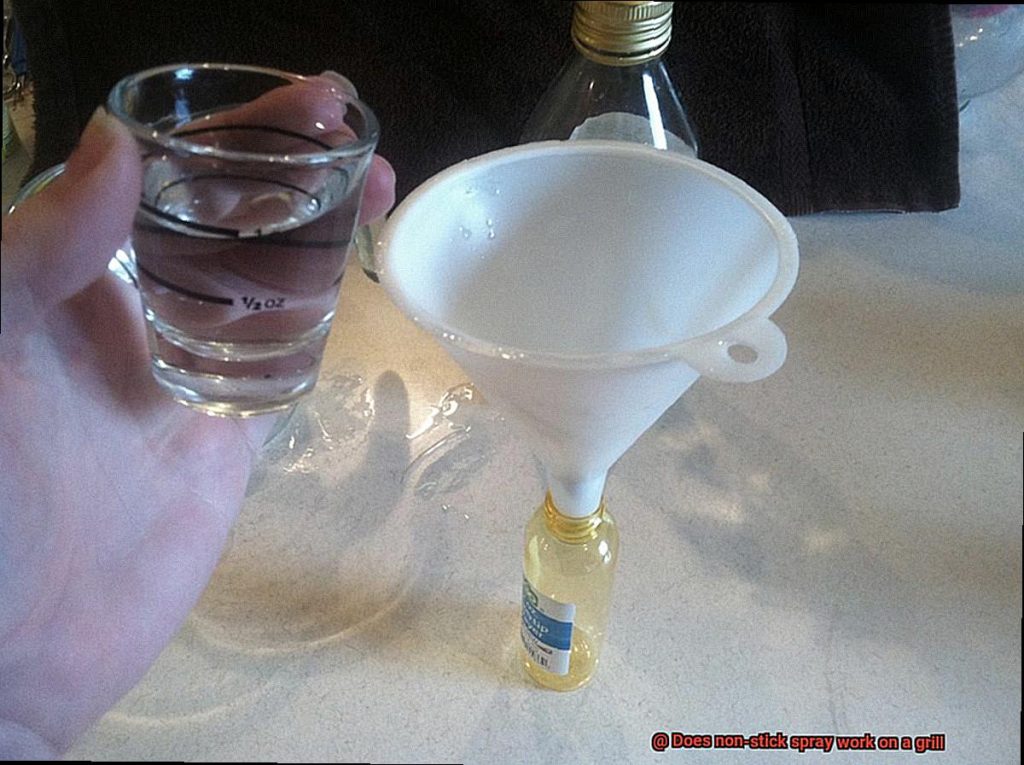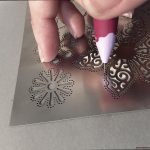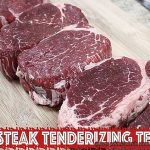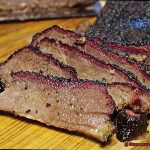It’s that time of year again – grilling season. Nothing beats the smell of juicy burgers and perfectly charred vegetables sizzling on the grill. But, let’s be honest, there’s nothing worse than when your food sticks to the grates. It can turn a fun summer cookout into a frustrating experience. Luckily, there’s a solution: non-stick spray.
Now, you may be wondering whether or not non-stick spray actually works on a grill. The answer isn’t straightforward. While it can definitely help prevent sticking, it’s not always foolproof. Some people swear by it while others find it more trouble than it’s worth. In this post, we’ll explore the effectiveness of non-stick spray on the grill and give you some tips on how to use it effectively.
First things first, let’s talk science. We’ll delve into how non-stick spray works and why it may or may not be the best choice for your grill. Then, we’ll get into the nitty-gritty details of how to apply the spray correctly for optimal results.
But wait, what if you’re not a fan of non-stick spray? Don’t worry – we’ve got you covered too. We’ll share some alternative methods for preventing sticking that don’t involve using any sprays at all.
Whether you’re an experienced griller or just starting out, this post will provide you with all the information you need to make an informed decision about whether or not to use non-stick spray on your grill and how to do so effectively. Get ready to up your grilling game and impress all your friends at your next cookout.
Contents
What is Non-Stick Spray?
Non-stick spray is a magical cooking spray that can make your time in the kitchen a breeze. It’s composed of a combination of vegetable oil and lecithin, which acts as a barrier between your food and the cooking surface. This barrier prevents food from sticking onto cookware or baking dishes. From pans to griddles and baking sheets, non-stick spray is a versatile tool that can save you from the frustration of scraping food off a surface.
One of the most significant advantages of using non-stick spray is that it reduces the amount of oil or butter needed for cooking. This makes it an excellent option for those who want to cut down on calories or promote healthy eating habits. Furthermore, cleaning up after cooking becomes a breeze since food no longer sticks to the cooking surface. Non-stick spray comes in different variations such as butter-flavored or olive oil-infused, providing new flavors to the food being cooked.
However, it’s crucial to choose a safe non-stick spray. Not all non-stick sprays are created equal, and some may contain chemicals that can be harmful when heated at high temperatures, such as perfluorooctanoic acid (PFOA). Hence, it’s essential to read the label carefully before purchasing and choose a non-stick spray made with safe ingredients.
When it comes to grilling, many experts believe that non-stick spray can be an effective way to prevent food from sticking to the grill grates. Coating the grates with non-stick spray before cooking creates a barrier between the food and the grates, which helps prevent sticking and makes clean-up easier. However, some experts caution against using non-stick spray on a grill as it can create a flammable layer on the grates and potentially lead to dangerous situations.
Ultimately, whether or not non-stick spray works on a grill depends on various factors such as the type of grill and non-stick spray you’re using and your preferences when it comes to cooking and cleaning up after grilling. Research and expert advice can guide you in deciding whether or not to use non-stick spray on your grill.
Pros and Cons of Using Non-Stick Spray on a Grill
Grilling is the perfect way to enjoy the great outdoors while savoring delicious food, but dealing with sticky grill grates can be a real pain. That’s where non-stick spray comes in handy. However, before you start coating your grill with it, let’s explore the pros and cons of using this method.
The biggest advantage of using non-stick spray on a grill is that it makes cleanup a breeze. After all, who wants to spend hours scrubbing away at charred remnants of food? With non-stick spray, food won’t stick to the grates as easily, which means less residue left behind and less time spent cleaning up. Plus, it can help keep your food from falling apart on the grill, so you can cook your meats and veggies to perfection.
However, there are some potential drawbacks to consider as well. One concern is that the chemicals in non-stick spray could be harmful if they are heated and released into the air. Although most sprays are safe for cooking, it’s important to use them in a well-ventilated area and follow the manufacturer’s instructions carefully. And if you’re worried about any possible health risks, you can always go for natural alternatives like oil or butter instead.
Another issue with using non-stick spray on a grill is that it can sometimes leave behind a residue that builds up over time. This buildup can make your grill grates more difficult to clean and may even affect the flavor of your food. To avoid this problem, use non-stick spray sparingly and clean your grill thoroughly after each use.
Types of Non-Stick Sprays for Grilling
Grilling is a beloved pastime for many people, but it can quickly turn into a frustrating experience if your food sticks to the grates. This is where non-stick sprays come into play. However, not all non-stick sprays are created equal, and it’s important to know the different types available on the market.
One popular type of non-stick spray for grilling is vegetable oil-based. Made with all-natural ingredients like canola or soybean oil, this type of spray is perfect for health-conscious grillers who want to avoid artificial ingredients. In addition, vegetable oil-based sprays are versatile and can be used for different types of food on the grill, making them a staple in many grilling enthusiasts’ kitchens.
If you’re looking to add some flavor to your grilled foods, butter or margarine-based non-stick sprays are another option. However, it’s important to note that these types of sprays may not be suitable for high-heat grilling due to their lower smoke point. Nonetheless, they’re perfect for those who want to add a little extra taste to their grilled dishes.
Silicone-based non-stick sprays are another popular option for grilling. Although more expensive than other types, they provide a long-lasting non-stick surface that can withstand high temperatures. They’re also free of artificial ingredients and safe to use on all types of grills. If you’re looking for a reliable and durable non-stick spray, silicone-based options are definitely worth considering.
Lastly, there are non-stick sprays made specifically for high-heat grilling. These sprays are formulated to withstand the intense heat generated by gas grills, making them ideal for searing meats and vegetables. However, they may contain artificial ingredients and should be used sparingly. It’s important to read labels carefully when choosing high-heat non-stick sprays.
How to Properly Use Non-Stick Spray on a Grill
Grilling is a quintessential summer activity, but dealing with food that sticks to the grates can be a real buzzkill. Fortunately, non-stick spray can be a lifesaver in such situations. Here are some expert tips for using non-stick spray on your grill:
Select the Right Spray
To ensure that the non-stick spray works effectively, choose a product that is specifically designed for high-heat cooking, like grilling. These sprays have a higher smoke point and won’t break down or become toxic at high temperatures.
Prepare Your Grill
Before applying the spray, ensure your grill grates are clean and dry. Any leftover food or grease can hinder the effectiveness of the spray and cause sticking or flare-ups.
Apply the Spray Correctly
To apply the non-stick spray, hold the can about 6 inches away from the grates and spray in a sweeping motion. Ensure that all areas you will be cooking on are covered, but avoid using too much spray. Excessive spraying can cause flare-ups and damage your grill.
Let it Dry
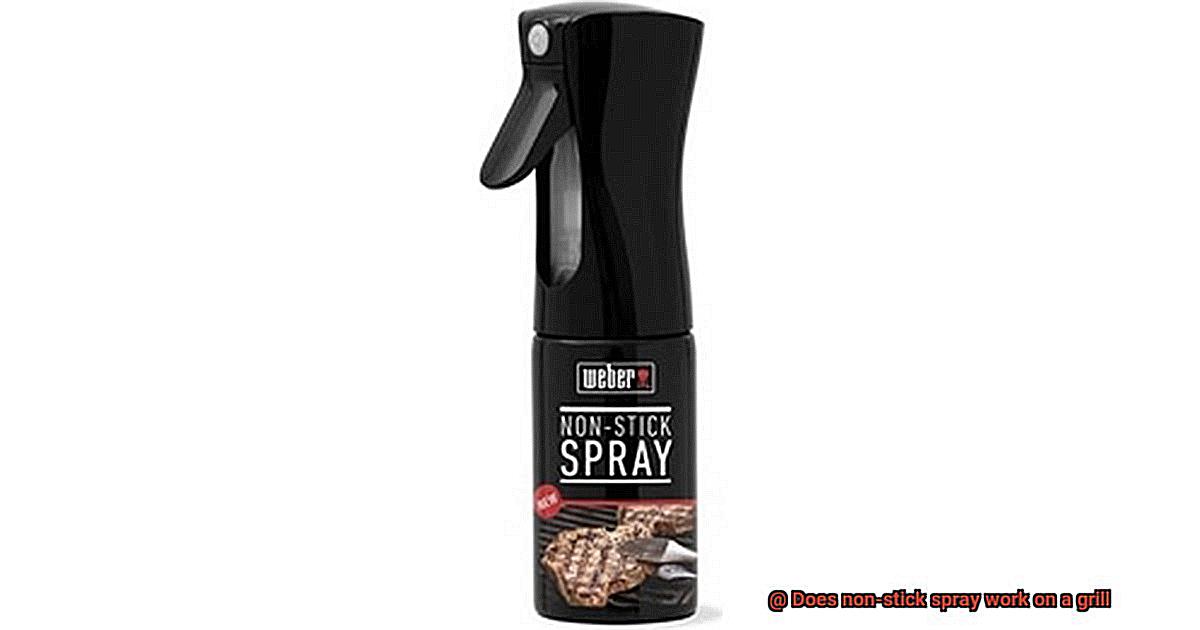
Allow the sprayed grates to dry for a few minutes before adding food to the grill. This will prevent any spray drips from falling onto the burners or causing smoke or fumes.
Exercise Caution
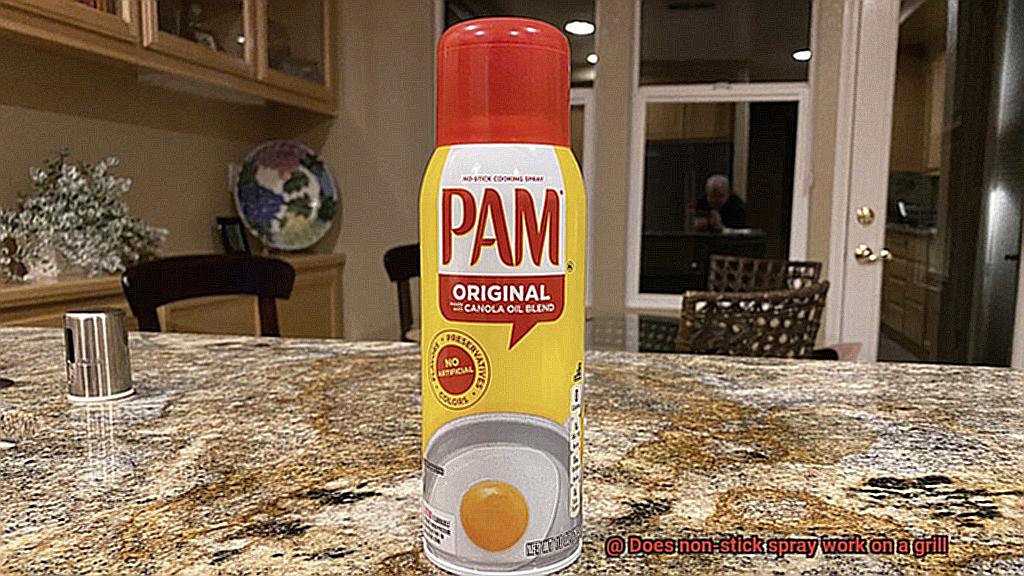
When applying non-stick spray to a hot grill, use caution as it can cause flare-ups or start a fire. It’s best to spray the grates when they’re warm but not hot; also, turn off any flames or remove hot coals before spraying.
Tips for Keeping Your Grill Clean and Safe While Using Non-Stick Spray
Grilling is a popular outdoor activity that many people enjoy, but cleaning up after can be a daunting task. Luckily, non-stick spray can make the process easier. However, it’s important to use it safely to avoid any potential hazards. Here are some tips for keeping your grill clean and safe while using non-stick spray.
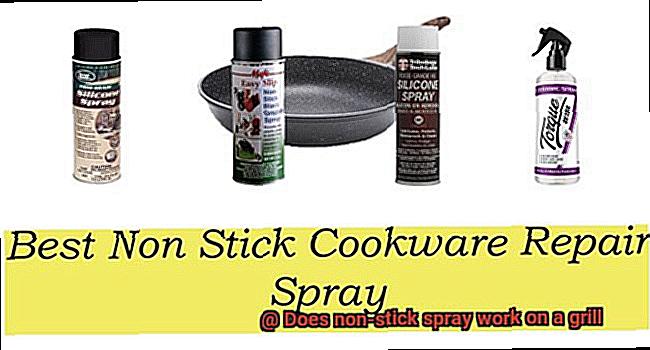
Read the Instructions Carefully
Before using any non-stick spray on your grill, it’s important to carefully read the instructions and follow them exactly. This will ensure that you are using the product safely and effectively.
Use a High-Heat Resistant Spray
Look for a non-stick spray that is specifically designed for high-heat cooking, as ordinary cooking sprays may not be suitable for use on a hot grill. This will also prevent the spray from burning and producing harmful fumes.
Apply the Spray Before Heating the Grill
To ensure even coverage and prevent flare-ups, apply the non-stick spray to a cold grill before preheating it. This will allow the spray to heat up and create a protective layer on the grates.
Don’t Use Too Much
It’s important not to overdo it with non-stick spray, as excess spray can cause flare-ups and potentially dangerous situations. Use a light coating of spray to prevent food from sticking without creating excess smoke or flames.
Clean the Grill Regularly
Even with non-stick spray, grills still need to be cleaned regularly to prevent buildup of grease and other debris. Use a grill brush or scraper to remove any food particles or residue after each use. This will also help prevent any potential hazards.
While grilling, keep an eye on the spray. If it starts to smoke or burn, turn down the heat or remove the food from the grill until the smoke subsides. After grilling, let the grill cool down completely before cleaning it again.
Alternatives to Non-Stick Spray for Grilling
Grilling is a beloved pastime for many, but the aftermath of cleaning up can be a daunting task. While non-stick spray is a popular choice for many grillers, some may want to explore alternative options for various reasons. Whether it’s health concerns or simply wanting to try something new, there are several alternatives available that can elevate your grilling game.
One alternative to non-stick spray is using oil. By lightly coating the grill grates with high smoke point oil like vegetable or canola oil before grilling, you not only prevent food from sticking but also add flavor and moisture to your meals. It’s a healthier option that avoids the use of chemicals commonly found in non-stick sprays.
Another option is using a marinade or rub on your food. This not only adds flavor but also creates a barrier between the food and the grill grates, preventing sticking. Be sure to choose a marinade or rub that complements the type of food being cooked. For example, use a citrus-based marinade for fish and poultry or a sweet and spicy rub for beef.
For those searching for a completely non-stick option, using a grill mat or basket can be effective. These mats and baskets are typically made of non-stick materials and can be placed directly on the grill grates. They prevent food from sticking while also making clean-up a breeze.
YwXS1IVewi8″ >
Conclusion
To sum it up, non-stick spray can be a lifesaver when it comes to grilling. But let’s face it, not all sprays are created equal. It’s crucial to pick a safe and natural option that’s designed for high-heat cooking. And don’t forget to prep your grill grates by cleaning and drying them beforehand.
If you’re not keen on using sprays, there are other ways to prevent food from sticking. For instance, you can use oil or marinades/rubs on your food or invest in a grill mat or basket. Whatever method you choose, make sure to keep your grill clean and free of grease and debris.
In the end, summer is all about enjoying delicious grilled meals with friends and family. So don’t let pesky sticking issues ruin the fun.

